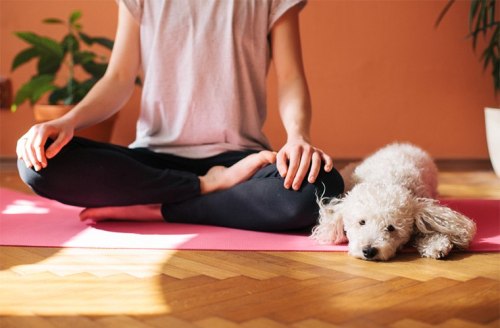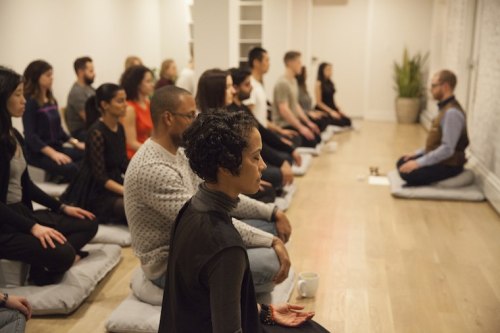Developing a regular mindfulness practice has always been a goal of mine. I’m an anxious person and I know it would help, but I’m more of a sweat-it-out-in-boot-camp than a sit-still-and-breathe type. But after I went to an event thrown by the David Lynch Foundation, where I listened to successful career women like Arianna Huffington and Robin Roberts rave about how Transcendental Meditation (TM) transformed their lives, I was more determined than ever to ace this whole meditation thing. But what do you do if meditation doesn’t seem to work they way it supposed to?
I decided to sign up for a three-day TM training where I learned to focus on a mantra—allowing other thoughts to come and go—for 20 minutes a day, twice a day. For three months, I carved out time, getting up early in the morning and sneaking off to a deserted corner of the office every single afternoon. (Yes, I was that person.) I was consistent and disciplined, devoting 40 minutes daily to a practice that’s been proven to work for everyone from at-risk kids to the U.S. military.
And in the end? Nothing changed. It still felt like a struggle, and I didn’t notice any real difference in my well-being or anxiety levels. Was I doomed to be a meditation failure? Is it possible that some people just can’t “do” mindfulness? Curious, I reached out to some of the top experts to find out if I was alone—and to hear their advice.
Here’s what to do when meditation doesn’t work for you

Experiment, experiment, experiment
Mindfulness, the practice of cultivating an awareness of and gratitude for the present moment, dates back to 2,500-year-old Buddhist psychology. Surley, if people have been practicing this for thousands of years, I too can do it…right? The first person I reached out to was Lodro Rinzler, chief spiritual officer of MNDFL, New York City’s first drop-in meditation studio. They have 30 different teachers—all with different styles. His take? “I don’t think it’s that meditation isn’t for you…maybe it’s just that TM isn’t for you.”
“It’s like this,” he continued. “When I was a kid, someone gave me a violin and said they thought I’d be really good at it. I tried it for a few months, but it wasn’t for me. But maybe if someone had said, ‘Here’s a violin, a piano, drums, and a guitar,’ I would have found an instrument I connected with and stuck with it.”
Because I have a restless mind and I like to be active, Rinzler recommended I start with walking meditation. He coached me to be aware of how my body was moving, how my footsteps were falling, and how my feet were shifting through space. I gave it a try on my daily commute and I’d like to be able to report that it was a huge success—but I still got bored and missed listening to music. Nonetheless, being reassured by a master that there isn’t just one way to meditate made me feel better about continuing to search for my personal meditation jam.
Also, keep in mind that meditation might not work for you if you’re anxious. Claire Grieve, a yoga specialist and meditation expert, says calling attention to your discomfort can exacerbate the issues you’re feeling. “Mindfulness and body-scanning practices ask that you tune in to how you are feeling and to simply notice what is happening,” she says. “It is possible that tuning in to your feelings like this can amplify the anxiety around them.”

Consider a group setting
I like going to group fitness classes, so why not group meditation? At Rinzler’s suggestion, I tried MNDFL’s Intentions class, a 30-minute meditation in which he asked the (packed) room to focus on one quality they want to live out. “How do you put this into practice at work tomorrow?” he asked. “What does this look like in your relationships?” Having that guidance definitely helped, but I was also too aware of everyone around me to fully let go. What if my stomach growled because I was hungry? What if I had to pee?
My second attempt was better. I tried yogi extraordinaire Keri Setaro‘s “What To Do When You’re Freaking Out” mindful techniques seminar at Naturopathica. It was held in a dimly lit room with a nature landscape projected onto the wall and focused on different breathing exercises that can help when bouts of anxiety or depression hit.
I learned to draw breaths from deep within my gut, hold on the inhale for five seconds, and then count to five again after slowly exhaling. Setaro really got into the nitty gritty about the messages sent between the brain and the gut and how breathing can make all the difference. She spoke a language that I personally connected with, which (again) is why experimentation is so important. Maybe mindfulness is like dating: You’re not going to want to swipe right on all methods.

It’s okay to keep your meditations short and sweet
Yes, meditation is a practice that requires discipline, but both Rinzler and Serato stressed that it’s totally fine to meditate for a few short moments throughout the day. For me, that means doing controlled breathing exercises whenever I start to feel overwhelmed. Meditation apps like Headspace, Insight Timer, Aura, MyLife, and Smiling Mind are great for squeezing time for mindfulness into your day wherever you are. (Naturopathica’s lemon balm-based Chill Aromatic Alchemy has been enhancing my meditative moments, too. I rub a couple of drops on my wrists, start breathing deeply, and my heartbeat soon slows.)
Meditation can take on many forms. You don’t have to sit upright or be in a completely quiet space. And the goal should never be to completely clear your head. My restless mind didn’t mean I was doing meditation wrong—it’s normal to continue having thoughts. The goal of meditation isn’t to master it. “This is a big misconception,” says mindfulness expert and ABC News Anchor Dan Harris. “People think that there is some type of successful state you will reach and then you will have mastered meditation, but that is not at all how you should look at this.” Your only goal should be to steadily increase mindfulness and self-awareness.
The funny thing is, once I stopped forcing myself to meditate the “right” way, it got so much easier to sit for longer stretches. I recently went to Inscape—the new meditation wonderland from Intermix CEO and founder Khajak Keledjian—and for 22 whole minutes, I breathed along as a soothing electronic voice led a simple meditation. That may not sound like much, but for me it was huge.
Ultimately, I’m still not the type of person who willingly sits for 30 minutes every day—it’s just not my thing. But I no longer think that means I’m a meditation failure. Now I know it’s an effective anxiety-reducing tool, just like going for a run, grabbing tea with a friend, or journaling—and I’ve learned ways to tap into it that actually works for me.
Try this meditation tonight to help you fall asleep:
Oh hi! You look like someone who loves free workouts, discounts for cult-fave wellness brands, and exclusive Well+Good content. Sign up for Well+, our online community of wellness insiders, and unlock your rewards instantly.
Sign Up for Our Daily Newsletter
Get all the latest in wellness, trends, food, fitness, beauty, and more delivered right to your inbox.
Got it, you've been added to our email list.











